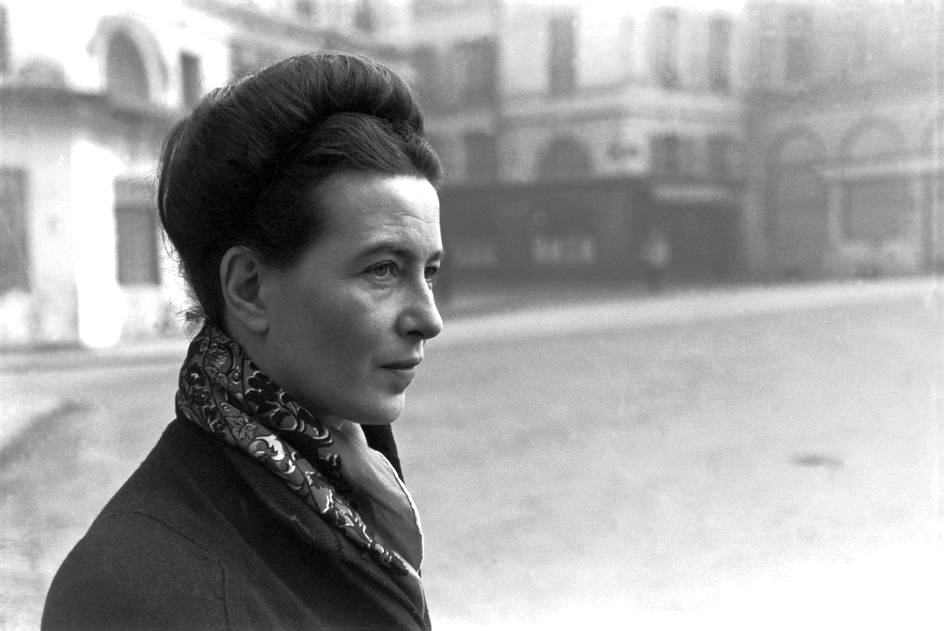On Beauvoir
In her sophisticated philosophical account of gender, Beauvoir argues that normality, common sense, the 'norm' is male; but also everything that is positive. In opposition, femininity/womanhood is all that is negative. The implications are that a man never begins by positing himself as an individual of a certain sex, as his assertions shall not derive from this basic truth. Being a man is not seen as a particularity, as men are not seen to be constrained by their bodies. The opposite applies to women.
In her theory of the 'Other,' inspired by Hegel's master-slave dialectic, Beauvoir sees women determined and differentiated in relation to men (but not viceversa). Women are defined as other, that is as lack of self, as inessential beings in from of the essential (men). Being female is defined as a failure to be a man. Although women sense this necessary link which connects them to men, they tends to make no claim for themselves as subjects, lacking the concrete means to posit the reciprocity that Beauvoir sees as fundamental for a healthy relationship between the genders. Moreover, Beauvoir sees this 'othering' relationship as systemic and not accidental, that is imprinted in our institutions, culture, minds, etc. and thus leading women to internalise oppression. Indeed, women can often derive some sort of satisfaction from her role as 'Other.' This is an important insight by Beauvoir, that both men and women can be complicit in sexism and patriarchy, even if the patriarchal dividend means that it will always be the male sex and masculinity that are privileged in our society, a fact that cannot be controlled by individuals (even the most feminist men benefit from the relational, interstitial operation of gender as a system of power).
But how is this female 'Other' constructed? The roots lie in philosophy, religion and science. Quoting Poulain de la Barre, Beauvoir points out to how 'those who made and compiled the laws, being men, favoured their own sex, and the jurisconsults have turned the laws into principles.' Thus, lawmakers, priests, philosophers, writers and scholars have gone to great lengths to prove that women's subordinate condition was willed in heaving and profitable on Earth, and religions forged by men reflect this will for domination. As the medical sciences became ever more important by the end of the nineteenth century, anti-feminists began to draw on biology, experimental psychology and so forth. Biological determinism was therefore used as a justification for oppression (and still is in some circles), expanding the idea that women's bodies act as constraints through pregnancy, motherhood, menstruation or general physical weakness without realising that biology need not be destiny if addressed by institutions in a way that female bodies do not become mere flesh.
Aware of the situatedness of women's role as 'Others,' Beauvoir rejects the biological determinism of women as simple reproductive beings (which would lead her to a much contested critique of motherhood) and instead advocated for women to 'transcend' their biological limits. Because for Beauvoir existence precedes essence, that is who we are is who we become over our lives, one is not born but becomes a woman. Identity is thus formulated by our 'social embeddedness,' and women have the responsibility to collectively emancipate, both transcending biological determinism and establishing reciprocity as the fundamental norm in gender relations. Oppression (and therefore freedom) are situated, and as a result female emancipation can only be achieved when women stop lacking the concrete means to organise themselves into a unit that could posit itself in opposition. For Beauvoir, with her background on Heideggerian phenomenology, a first step is to look at experience, that is how people live their lives and how they experiences their bodies, in order to fight for emancipatory structures.
Beauvoir's account of gender and its 'othering' mechanisms shares the framework with other theories on dehumanization projects such as racism. Indeed, in her writings she recognises how the justification processes for different types of discrimination such as race, class or sex tends to be the same, and how advocates of discrimination often argue for a 'separate but equal status' which leads to structural systems such as that of Jim Crow in the US. For Beauvoir, egalitarian segregation serves only to introduce the most extreme forms of discrimination, and for that reason she advocates a 'transcendence' not so different from Fanon's own radical humanism.
Although Beauvoir's philosophically eclectic exploration of gender remains relevant in may ways today, later feminists have pointed out to the limitations of her theory. First, her view of transcendence sees emancipation as being the same for both men and women, is based on a masculinist view of human nature and refuses to acknowledge the possibility of gender-specific values such as female values that could be celebrated (motherhood). Second, she places too much emphasis on the heterosexual dyad as the framework from which to think about (gender) reciprocity and thus dismisses and silences other sexualities. Fourth, she does not perceive reproductive work as labour, again dismissing gender-specific values for a masculinist view of transcendence. And fifth and last, she tends to place the white, Western woman as the prototype for womanhood, an 'universal woman' that is not that universal on second thought. Looking at other theories such as social learning theory, psychoanalytic theory, sexuality theory or performativity theory can help us expand our horizons in terms of how to approach the question of gender.


Comentarios
Publicar un comentario